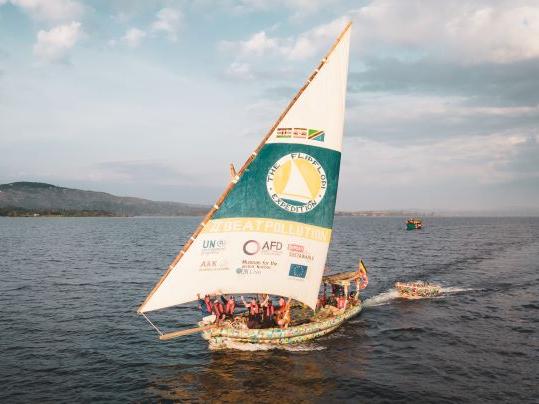Academics from Northumbria University have travelled to Kenya to help establish a new Heritage Boat Building Training Centre which will use indigenous knowledge and skills to transform single use plastics into traditional sailing vessels.

Thanks to a grant from UK Aid, senior lecturer Simon Scott-Harden and senior technician Johnny Hayes, from Northumbria’s School of Design, spent time working with environmentalists and the local community close to the northern coast of Kenya, in the Lamu Archipelago. Their trip was to help establish a facility capable of designing and constructing recycled plastic sailing vessels using some of the millions of tonnes of plastic waste which makes its way into our seas each year.
Simon, an expert in product and material design, first became involved in the Flipflopi Project in 2017, when he supported the community to create a traditional dhow sailing boat weighing seven tonnes called the Flipflopi, made from plastic waste and over 30,000 discarded flip flops collected from the coast of Kenya.
Now a major circular economy movement in East Africa, the Flipflopi Project was co-founded by former Northumbria University student, Ben Morison and two Kenyans, Ali Skanda and Dipesh Pabari. These days the organisation runs education programmes and innovation hubs to help generate public and policy engagement on reducing plastic waste.
“The UK Aid grant is a major step forward and there’s such potential for this closed-loop model of using waste plastics to create traditional sailing vessels to be widely replicated in coastal communities all over the world,” explained Simon, who teaches students on the BA (Hons) Design for Industry programme at Northumbria.
“It’s about tackling pollution and keeping some of the traditional boat making skills alive. We have been working to get a production line up and running for recycling the plastics and certifying the material which comes off it to demonstrate that it’s a viable alternative to locally sourced timber and reducing the environmental impact.
“What the end result will be is a fully online recycling centre based in Lamu and run by local Kenyans where we can process tonnes of plastic a day to turn it into new parts for buildings, construction and traditional sailing dhows, alongside a centre for heritage skills to keep the dying art of traditional dhow building alive.”